Should I buy a car if it has a history of being in an accident
Should I Buy a Car if it Has a History of Being in an Accident?
If you are thinking about buying a used car, there are some important considerations you will want to make before you take this type of financial step. First and foremost, you want to be aware of the vehicle’s history and this of course, includes whether it has ever been involved in an accident.Even in the event, the vehicle of interest has been in accident, the question next on your mind should be whether or not is it still ok to buy this car?
Since there can definitely be advantages to buying a used vehicle, lets dive a bit deeper into the issues surrounding buying one that does have a history of being in a collision.

The Advantages of Buying a Vehicle That Was in an Accident
Some benefits of buying a used car – accident or not, have to do with being more environmentally-friendly as well as of course being more affordable. Compared to buying a new vehicle, you are looking at paying a lot less for a used vehicle that has already depreciated significantly.
Furthermore, if the one you are interested in has a history or being in an accident, the asking price is also even more likely to be much lower than one with track record of being accident-free.
Disadvantages of Buying a Vehicle That Was in an Accident
Of course, there will also be some disadvantages to factor into your decision to buy a used vehicle with accidents in its past. For example, while the upfront costs may be a lot less, you want to be leery of whether or not the car does have unforeseen damage or is not in proper working condition.
If this does turn out to be the case and you were not aware or you did not think this would be an issue, either way you could incur more maintenance and repair fees down the line, which can definitely offset the reduced fees you paid in the beginning.
While of course, this does not reflect an ideal scenario, on a more positive note, regardless of whether a vehicle has a collision history or not, does not have to mean you will be purchasing a lemon.
Additional Considerations
Not only will you want to be aware of whether the vehicle was ever invoked in an accident, it is also equally important to learn about its complete history, including the nature of the damage and the types of repairs it has received. This can help you to not be caught off guard down the line with any existing damage that has not been adequately fixed and in turn affect the performance and safety of the vehicle.
This complete history also includes previous registration details, and even any recalls that vehicle model may have experienced. You can turn to various companies that help with these types of evaluations.
For example, a reputable mechanic can perform a thorough inspection of the vehicle, before you move forward with this purchase. During this process, the vehicle, despite having been in an accident, may be a sound choice as it may have been well taken care of, following these events.
What to Know about Insuring a Vehicle with a History of Being in an Accident
A vital piece to this purchase decision, should also include how the car is likely to stack up against new or ‘non-accident’ used cars, when it comes to obtaining insurance coverage.
For example, this is also where knowing the vehicle history and accident details, including the exact nature of the damages and repairs will come into play.
In the event, the damage was extensive and the vehicle was resold with a salvage title attached to it, this can mean that the vehicle is then deemed to have had major structure damage. Not only does this mean the value of the car will be much lower, it could even mean that it will be uninsurable.
While a vehicle with a history of accidents will be less in value, owning a car with this type of track record does not have to preclude you from being able to acquire the insurance you need. However, purchasing one that has had minimal damage and a solid repair history will improve your access to more affordable and appropriate coverage.
The bottom line is that doing your homework and learning as much about the background and the current condition of the vehicle will be an extremely important part of your decision to buy a used vehicle.
If you are unsure whether the insurance company will be able to provide coverage or how high this policy will be, it is best to reach out to the insurance agent first and find out what you can expect from this process.
Leaders Insurance has its own strong track record of providing car insurance policies for a variety of vehicle types and driver’s needs. Contact us to learn more about how we can support your goals of purchasing a quality used vehicle.
How to keep your pet safe while driving
How to Keep Your Pet Safe While Driving (3 tips)
Planning to drive safely should always to be a top priority. With that being said, when driving with pets in the car, there will also be some additional precautions you will want to arrange before heading out on the road.Whether you will be venturing out on shorter trips or making longer hauls, here are 3 tips to help keep your pet safe while driving.
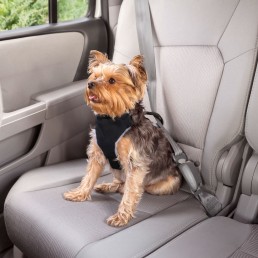
Choosing the Best Travel Equipment
One of the first steps you can take to ensure your pet’s safety is to purchase a product to help protect your pet while in transit. There are several options to choose from that range from harnesses and car seats to crates and carriers. Each serves unique purposes and can be a safe option for a range of pet needs.
Harnesses, for example will allow for some movement by your pet while in the vehicle, however will provide support if you are involved in a car accident. These devices will vary depending on the size of your pet – and in many instances, can be used for dogs and cats.
Car seats, on the other hand, are more commonly used for dogs that are small to mid-sized. These seats can be fitted to the size of your pet and again, in the event of sudden stop or collision, can provide added padding and security for your pet.
Lastly, crates and carriers are another staple for travelling with pets that are a variety of sizes. These containers of course, prohibit animals from roaming freely in the vehicle. However, it may also be a good idea to combine this travel hardware with a harness to add further protection to your pet while on route to your destination.
There are several factors that go into deciding which type of travel equipment is the most suitable option for you and your pet. That being said, it is a good idea to do some additional research to identify which one is ideal for your personal situation, at this of course includes what your pet can tolerate best.
Practicing Travel Training
Another very important part of this process is to help ease your pet into these types of outings by doing some travel training. Each type of travel method and travel equipment will likely use some getting used to so that your pet does not become too anxious or distressed while being on the move.
You can begin with shorter trips and then progress to some longer ones to allow for your pet to adapt to this new set up. Especially if you will be gearing up for extended travel, this added practice can be even more important and in turn, help to ensure the overall well-being of your pet.
Packing a Pet Travel Kit
One final, yet vital tip is to remember to pack your pet’s travel kit. This kit can include all of the supplies that they may need to be safe and content though out this excursion.
Supplies you will typically want to add to the travel kit are: a leash, food and water, the respective bowls, and any ‘bathroom’ essentials you will need, such as bags and tools to be able to attend to their waste, and if you pet is a cat, then also kitty litter and a kitty litter box.
Additionally, your pet may also greatly benefit from having some other comforts, including any toys or blankets that they use regularly at home. It doesn’t also hurt to travel with your pet’s health information, including immunizations and medications, and other veterinarian health records. These will come in handy, especially if you are travelling far from home and your pet might require emergency care.
When all is said and done, we want to protect our pets as they are an important part of our lives. These tips can allow you to keep your furry loved ones safe and sound as you travel around BC or beyond.
Having the best insurance in place is also well-worth the additional consideration and can help you protect your pet. By having a variety of insurance policies to cover your travel needs and your pet’s needs, together, you can all travel more comfortably and confidently.
Contact Leaders Insurance to learn more about the insurance coverage we offer that can best support your needs. After that, we hope you continue to enjoy the open road, with your beloved pet by your side.
Why you Should Replace a Car Seat After a Car Accident
Why you Should Replace a Car Seat After a Car Accident
While car accidents are the last thing we want to happen, especially while driving with children in the vehicle, sometimes they are simply unavoidable. With that being said, it is essential that there are safety measures put in place to protect yourself and your loved ones from harm.One of the questions likely on the minds of many parents and drivers is whether or not a child’s car seat should be replaced following an accident. Many experts in this field will answer, yes to this question. The reality is that any damage to the car seat can further impact a child’s safety while they are occupying that seat. In the event, there is another accident, even a minor one, the car seat may not provide the level of protection it is meant to.
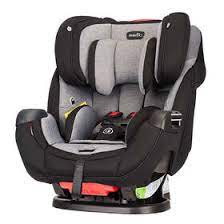
When Should You Replace a Car Seat?
There are a few different scenarios that can help you make the right call when it comes to replacing a child’s car seat and this begins with identifying the nature or severity of the collision.
Moderate to Severe Collisions
First of all, it is absolutely recommended that a child’s car or booster seat is replaced after a moderate to severe car accident. If you are unsure of whether or not a car accident falls under this category, you can consider facts such as whether the car’s functionality has at all been affected as this can signify a moderate crash.
In terms of a more severe crash, criteria for this relates more to any damage to the vehicle structure, that makes the car unsafe to drive. In these cases, it is definitely best to opt to replace the car seat. Even if during the time of the accident, a child was not in the car seat, it is still necessary to identify when a car seat should be replaced.
Minor Collisions
Secondly, it is also important to consider whether you should replace the car seat if you were involved in a minor collision. With a minor crash, the damage to your vehicle may be mostly unnoticeable, even invisible. However, a minor crash can be classified as one where air bags did not need to be deployed, and when the vehicle can be driven away afterwards without immediate safety concerns, such as damage to the drivers’s side door. Additionally, in the absence of injuries to any of the passengers, this points to a minor accident as well.
With a minor collision, it is likely that the car seat is safe enough to continue use, however, the car seat must first be inspected for zero signs of damage. All things considered, it is recommended that you consult the car seat’s manufacturing guide to find out what is advised for that specific type of car seat. The company will state one way or another whether the car seat needs to be replaced following a minor fender bender.
The principal that it is always better to be safe than sorry, is certainly a relevant one for this type of situation. That being said, replacing a car seat that was involved in any type collision is definitely worth serious consideration, and highly recommended in the case of a moderate to severe accident.
Car Seat Reimbursement
In the event, you have been involved in a car accident and plan to move forward with replacing your car seat, as a BC resident, fortunately you may be able to be reimbursed for some of the costs associated with this. To find out more about car seat replacement eligibility, it is suggested that you can do some additional research, as well as speak more with an expert in this area.
Insurance Coverage
In the end, having the right insurance is also extremely important. To learn more about the types of vehicle insurance coverage, contact Leaders Insurance. We are more than happy to help with any of your insurance needs, and above all, we want to provide you with the added peace of mind of feeling safe while driving with your precious loved ones along for the ride.
Do I Need Separate Insurance for My RV/Trailer?
Do I Need Separate Insurance for My RV/Trailer?
Do you have an RV or travel trailer that you are looking forward to using this year? If so, one piece of important information to be aware of before you head out on the open road, is whether or not you should purchase separate insurance.The answer is that, yes, it is recommended that you do obtain insurance for your travel trailer or RV needs. Since this can be a large financial investment, having the right coverage can help you to feel protected in a number of key ways.
Of course, there are also various manners you may be travelling, including motor homes or RVs, and travel trailers, so opting for the best insurance features for your specific needs is also very important.
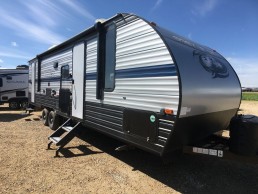
Motor Homes & RVs versus Travel Trailer Insurance Coverage Motor Homes & RV Coverage
Similarly, to purchasing car insurance, you can purchase insurance for your motor home or RV. How this differs however, is that the type of coverage you will get for these types of travel vehicles, will also include areas such as contents and standard equipment that both fall outside the scope of your other vehicle insurance coverage.
While, ‘contents’ coverage involves items such as linens, kitchen items such utensils, dishes, etc, under the ‘standard equipment’ category, you are looking at insuring the items that are attached to your motor vehicle, including appliances.
Travel Trailer (& Fifth Wheel) Coverage
The Insurance Corporation of BC (ICBC) offers coverage known as ‘Vehicle Travel Protection’ and it includes packages that meet your auto towing needs. This includes, campers, trailers, etc, ultimately the vehicles that will be towed, so if this reflects your needs, it is worth looking into.
As you can see, these policies offer a wide range of coverage for your vehicle travel needs. That said, it is best to enquire about the specifics of these packages and to learn more about what is coverage, as well as about any existing exclusions.
Home Insurance Coverage
It is important to also note, that your home insurance coverage may relate to some of the areas, while you are traveling in a mobile home or fifth wheel vehicle. However, there will be some limitations. Again, is it a good idea to go over the details with an insurance agent, and find out what specific additional coverage you may need to purchase, in order to protect all of your travel contents, equipment, and the vehicle, itself.
Additional Travel Vehicle Coverage Considerations Vehicle Storage Coverage
If you are storing your vehicle, there is specific coverage for this instance. If this is a living space, then special coverage exists for this also and will be worth considering as an addition to your policy.
Accidental Loss & Collision Insurance
Of course, you may also want to consider taking out additional coverage for accidental loss or destruction of your mobile home or trailer. For example, a range of events that can cause damage to your vehicle, such as storms, fire and smoke, vandalism or theft, encounters with animals, and collisions with other vehicles.
Replacement packages also exist and can be purchased to help with the cost of a comparable replacement of the entire vehicle.
If you are using your motor home on a full time bases, there is another comprehensive package to consider. This type of coverage is designed to provide personal liability, protect personal contents, as well as additional living expenses that may be necessary for all year round mobile or trailer occupancy.
With all of the insurance options available, insurance agents well-versed in this field, can help ensure you have the best possible package for your intended motor home, RV, or travel trailer needs.
In the end, it is always best to opt for insurance, in order to protect your financial investment. Contact Leaders Insurance to discuss your RV and Travel Trailer insurance coverage needs.
Then, let all of your road travel and lifestyle adventures begin.
Avoid Getting Rear Ended & Take Precautions - Tips on how to avoid a domino collision
Avoid Getting Rear Ended & Take Precautions - Tips on how to avoid a domino collision
With the current BC weather fluctuating between warmer and colder weather, roadways have definitely kept drivers on their toes lately.While accidents can occur even on the clearest of days, recent icy weather conditions have caused some additional concerns when it comes to an increase in vehicle collisions in this region. In addition to smaller vehicles incidents, bad weather, among other unfavourable driving conditions can also lead to accidents that cause a chain reaction, involving multiple vehicles.
With that said, it is extremely important to be diligent and to follow the rules of the road, in order to protect yourself, your loves ones, as well as other drivers and their families. Read on to learn more about how to significantly reduce your risk of being involved in a rear end and/or domino collision.
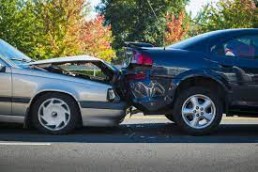
Safe Driving Tips: How to Avoid Domino Collisions
Adhere to the Speed Limit
One of the best ways to avoid getting in a collision is to follow the speed limit. In this case, speeding can definitely lead to unwanted crashes when out of the roads, especially during poor weather conditions. When in combination with high volumes of traffic, inclement weather, and driving faster than you should, there is a higher risk of vehicle accidents that can lead to chain reactions.
As drivers, we should always adhere to the speed limits, as they are set for a reason. In the event you have to stop unexpectedly, if you are travelling at a slower speed, it is more likely that you will be able to stop in time and avoid a serious collision.
2. Maintain Distance Between Vehicles
In addition to speeding, not maintaining distance between other vehicles is another driving error that can commonly result in a major traffic accident. In fact, the ICBC actually states that when driving, it is necessary to keep to a distance that allows for two – three seconds of space between each driver and the vehicle in front.
They also go on to recommend that when operating a vehicle when road conditions are less than ideal, such as when visibility is partially hindered by fog or rain, drivers should remain at a distance of 4 seconds. In cases of more extreme weather, such as icy and snowy conditions, it is deal that this space be increases even further – and up to 6 seconds should be the norm.
In order to improve road safety and to reduce the occurrence of domino collisions, it is important that drivers keep their distance from one another, gauging the time between each other along with the nature of the road conditions at any given time.
3. Remain Alert/Avoid Distractions
This third safety tip reminds drivers of the importance of remaining alert at all times. It can only take a second and If you don’t watch the car in front of you, you could be the one to rear-end another vehicle.
This level of awareness is also important so that you are aware of how other drivers are operating their vehicles. Not only do you not want to cause an accident, you do not want to fall victim to a car crash as a result of the unsafe driving of others around you.
By maintaining alertness and distracted-free driving, this can significantly lower your chances of being in any type of car accident – especially one that leads to the domino effect and can place others safety in jeopardy.
4. Steer Clear of Larger Trucks
Lastly, in order to avoid dangerous outcomes directly related to unsafe driving, drivers can also be proactive and staying away from larger vehicles. Since it is just poor weather conditions that can restrict visibility when driving, so can driving behind or beside large trucks.
There are other reasons that trucks can be the instigators when it comes to collisions, such as the loss of cargo that can rather abruptly fall down onto the the road and even onto near by vehicles.
Either way, these types of dangerous incidents have been known to lead to major accidents, including the frequent occurrence of chain reaction crashes.
In the end, by monitoring your speed, maintaining distance between other vehicles, remaining alert, and avoiding driving behind big trucks, you can greatly reduce your risk of being in a car accident. These actions can also provide a greater sense of protection when it comes to avoiding the hazardous consequences that can result from being involved in a dangerous collision.
Ultimately as drivers, it should be our top priority to keep ourselves and each other safe while on the roads at all times. One other way to remain protected is to have the proper vehicle insurance coverage.
Reach out to our experts at Leaders Insurance to ensure you have the best insurance package for your needs and in turn, keep all aspects related to safe driving at the forefront of your mind each and every time you get behind the wheel.
ICBC Rebate - What Does This Mean for Me?
ICBC Rebate - What Does This Mean for Me?
Following up again on the upcoming relief plan for high car insurance rates in BC, ICBC is poised to make changes in order to improve the extremely high insurance premiums. These high rates, for some time now, have placed BC residents right smack at the top of the list of highest rates compared to all other provinces.As previously revealed, the 15% reduction in rates is set to take effect on May 1st, and in the meantime, there will be some financial relief coming very soon in the form of the ICBC rebate.
If you are a BC resident and car owner, read on to learn more about what these rebates will mean for you in the upcoming weeks.
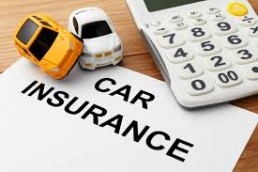
Who is Eligible?
As a BC driver, if you had an ICBC insurance policy between April 1 and September 30, 2021, you are very likely eligible to receive this rebate. There are however some exceptions, such as individuals with lower insurance usage, for example in the case of those with vehicle operating permits that spanned less than 15 days. Rebate cheques are expected to be mailed directly to those who qualify beginning on March 15th.
The origins of the rebates stem from the reduction in collision claims made during this time period. As a result of the COVID-19 pandemic, and perhaps also due to less vehicle operations overall, the Crown corporation was able to save approximately $600 million this year. These excess funds are being re-directed back into the pockets of many BC car insurance policy holders in mere upcoming weeks.
How Much Will You Receive?
It is important to also mention that the exact rebate amount that you will receive will depend on the type of coverage you had. With that said, these amounts will average approximately $190 for each eligible BC driver falling into this category. Ultimately, this amount is a breakdown of the 19% that each policy holder paid between April and September of the last year.
Furthermore, the BC government has stated that these amounts will be automatically calculated based on the nature of each individual policy. It is significant to also note that these payments also reflect the largest insurance rebates that have historically been paid out across the entire country.
As BC drivers wait for the Utilities Commission’s 15% insurance rate decrease to take effect in May, this timely monetary support is on the way. The rebates, combined with these future lower premiums, will aim to make driving in this province more financially manageable.
For more details on this rebate, it is suggested that you reach out to your insurance broker for the most up-to-date information.
At Leaders Insurance, we are here to support you with your individual insurance needs. As a driver in BC, we can offer you the insurance policy that best reflects the right amount of coverage for your vehicle and for your peace of mind.
As the province looks forward to more affordable vehicle insurance premiums, you can reach out to us with any questions you have about your current policy, as well as your future insurance needs.
How Much Cheaper will BC Auto Insurance Rates be Now?
How Much Cheaper will BC Auto Insurance Rates be Now?
Owning and operating a car often proves to be a large financial responsibility for many Canadians. This is the reality and can be, in part, due to the costs associated with insurance fees.While these fees range from one province to another, one thing is for sure, car owners in BC, have been experiencing much higher than the national average when it comes to vehicle insurance rates.
Fortunately, some financial relief appears to be on the way. If you are a car owner in BC and are hoping to have access to more affordable insurance rates, read on to learn more about some of the latest developments in this area.

In a recent move by then BC utilities regulator, and as per a request by the Insurance Corporation of BC (ICBC), BC residents are soon to see a 15% reduction in all basic insurance rates.
The plan being, that this initial 15% decrease will act as a short-term percentage reduction and will begin on May 1, 2021. Following that, the province’s Utilities Commission will determine a more permanent rate moving forward.
With this being the most significant rate reduction in approximately 40 years, this definitely shows that there is some light at the end of the tunnel for BC car owners.
Insurance Rates Across Provinces
To fully put these high rates into perspective, the Insurance Bureau of Canada (IBC) reports BC annual average insurance rates as high as $1832. Next in line is Ontario, who sits at a slightly lower rate of $1528. In rather drastic comparison, we have Quebec with the lowest of these premiums at $717 per year.
With BC insurance premiums currently sitting at the highest among all other provinces, these reduced rates will look to ensure that BC residents also have access to more affordable vehicle insurance. Ultimately, this change is set to place them more on par with other provinces, like Ontario or even Alberta, who’s residents by comparison experience yearly rates of approximately $1316.
How Will Drivers Save?
This move not only looks to lower these rates, however, it also involves the reallocation of substantial funds, in the hundreds of million dollar range. Currently, these finds are being used towards insurance legal fees, and moving forward, they will be used towards cases where individuals have sustained injuries as a result of vehicle collisions or crashes.
Overall, it is expected that these changes will translate into a 20% reduction in provincial premium claims, with an average decrease of $400 each year.
Insurance Rebates
Another move made by the ICBC will see rebates being offered to drivers to offset the cost of current rates as a stopgap until May, when the lower rates take effect.
While these rebates will still have to go through one final approval process with the provincial insurance commission, there is reason to remain positive that BC drivers we be able to take advantage of the rebates as soon as possible as more affordable insurance rates are just around the corner.
Turning to an insurance expert is an effective way to learn even more about these upcoming changes.
At Leaders Insurance, we are here to provide the most up-to-date information on car insurance premiums in BC. Contact us to learn more about these developments and together, we can find the car insurance package that is right for you.
NEW Enhanced Care Coverage Offered by ICBC - starting May 2021
Starting May 2021, ICBC will be offering Enhanced Care Coverage which is a Income Top-Up program for individuals involved in an accident where they will have loss of work. To find out more, please contact us at 604-469-1799 or read the information sheets below -
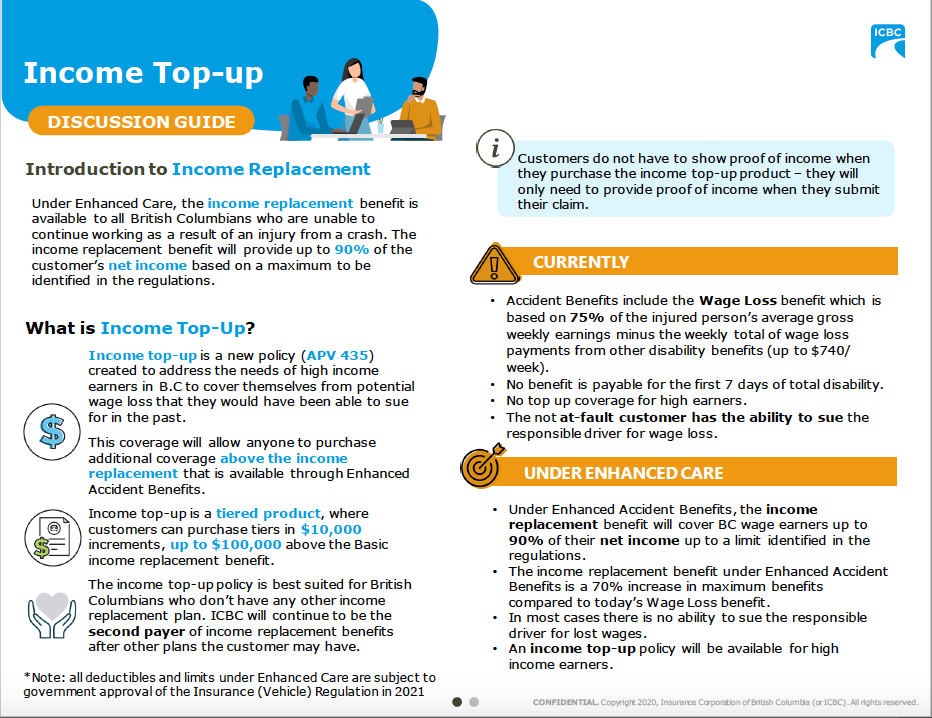
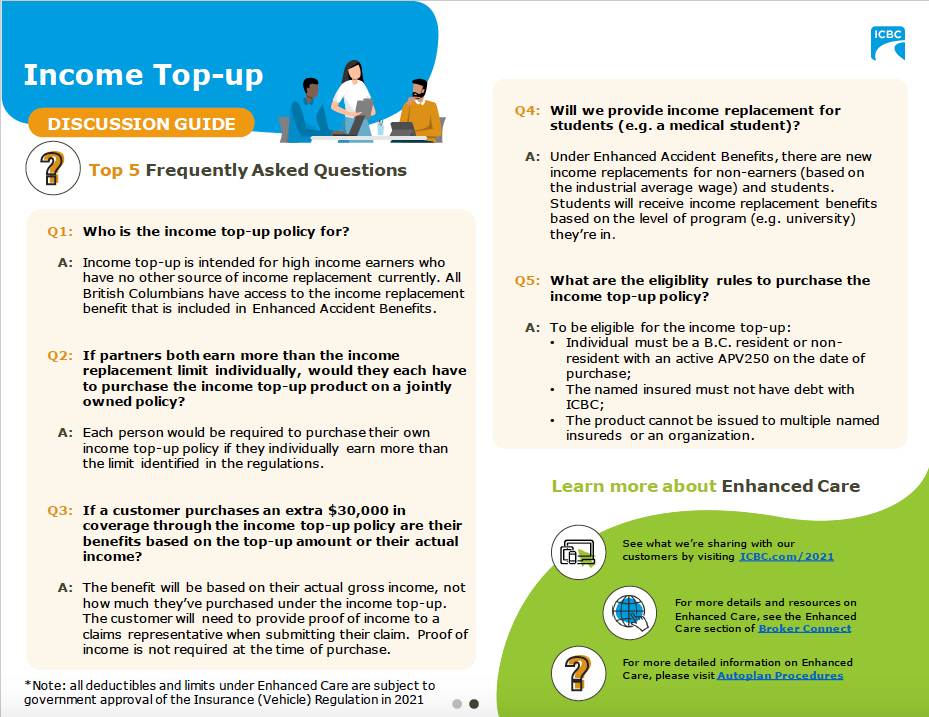
For more information on Enhanced Care, click here.
Getting Your 1st Car Insurance Policy & What to Expect
Getting Your 1st Car Insurance Policy & What to Expect
The exciting time has come, you are getting a car! With this new adventure also comes the added protection of having the proper car insurance that can provide the peace of mind you need to be able to operate this vehicle without any of the additional worry.With that being said, it is important to learn more about what to expect from this process. Here is some useful information to help you to get more acquainted with knowing what to expect from your first car insurance policy.

What Type of Coverage Do I Need?
In the beginning, it is best to learn about the different types of insurance coverage. Since some coverage is mandatory and some is optional, you will want to start by identifying the differences and then deciding what you will need. This part of the process also includes learning more about the amount of coverage you should have built into your policy as well based on your personal needs.
Liability Insurance
Liability insurance provides coverage, in the event you are deemed at fault or just as the name says, liable for an accident. This includes, injury to others, as well as damage to their property. In certain cases, this coverage can also help with payments towards your legal fees.
Direct Compensation
Direct Compensation coverage is also important to have in cases that relate to any damage to your own vehicle or if you suffer any bodily harm, as well as not being the one who is found at fault. As a result, for this coverage, you only need to go through your insurance provider to access this claim.
Collision Coverage
Collision insurance also falls under the category of claims being made were you are involved in a vehicle collision, however are not found responsible for the accident. In addition to the occurrence of a collision, in the event your vehicle is damaged as a result of coming into contact with road debris and other objects such as poles and guard rails, etc., then this type of coverage can also be beneficial to have.
Accidental Benefits
Having Accidental Benefits can also prove to be a very important insurance piece to consider as this type of insurance is designed to cover any medical-related bills and treatments, you or your passengers may require following an accident. It also includes any injuries that are caused to pedestrians who have been involved in the incident.
Uninsured Automobile Coverage
As well, just as the name states, this coverage pertains to the event where you are involved in an accident that has been caused by an uninsured driver. Since this individual is not operating their vehicle with the proper, and even in certain cases, the mandatory vehicle insurance, this means they will not have enough coverage or any coverage they can claim towards these costs. Therefore, by having this coverage yourself, you will be able to access funds from your own coverage to cover any damages.
Comprehensive Coverage
Last, but not least, we have comprehensive coverage. This final type of car insurance can be considered a one-stop shop as it is comprised of many different types of available auto insurance options. Specifically, it provides you with the coverage you need to protect you and your vehicle against a variety of damages. In fact, this coverages also relates to instances where natural disasters, rioting and acts of theft have led to your vehicle being damaged.
Once you have decided what type of coverage you need, of course turning to an insurance broker for support is key. Many insurance companies have well-known reputations that reflect the quality and nature of their services, so you can rely of these reviews to help you choose the best fit for your needs.
Which Factors Affect Insurance Prices?
As a first-time auto insurance buyer, you should be aware of aspects that contribute to your insurance policy rates. It is important to also keep in mind, that insurance prices are typically determined by a variety of factors that include: where you live, your age, your marital status, the length of time you have spent driving, and of course, your past driving history.
With this being a new experience, like anything else, it is important to do your research and make the most informed decision you can when deciding what type of vehicle insurance to purchase. It is equally important to choose an insurance broker that will be the right fit for you.
Contact our insurance brokers at Leaders Insurance for more information about how we can best support you in this new endeavour. We are here to answer any questions you may have and to also help you learn the ins and outs of your first car insurance policy.

